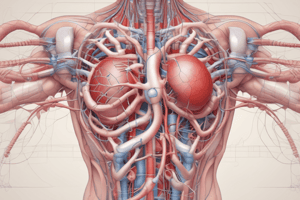Podcast
Questions and Answers
What is the primary goal of hemodynamic monitoring during aortic surgery?
What is the primary goal of hemodynamic monitoring during aortic surgery?
- To assess global ventricular function
- To identify blood loss early
- To monitor for myocardial ischemia
- To maintain stable hemodynamics (correct)
What is the significance of collateral blood supply in spinal cord protection during aortic surgery?
What is the significance of collateral blood supply in spinal cord protection during aortic surgery?
- It maintains spinal cord integrity during surgery (correct)
- It is essential for optimal perfusion of key organs
- It prevents paraplegia during surgery
- It ensures spinal cord function during surgery
What is a key aspect of anesthetic technique in aortic surgery?
What is a key aspect of anesthetic technique in aortic surgery?
- Using neuromuscular blockers
- Employing spinal anesthesia
- Using high-dose volatile anesthetics
- Utilizing a balanced anesthesia with an opioid and benzodiazepine (correct)
What is a potential ischemic complication that can occur during aortic surgery?
What is a potential ischemic complication that can occur during aortic surgery?
What is the primary purpose of transesophageal echocardiography (TEE) in aortic surgery?
What is the primary purpose of transesophageal echocardiography (TEE) in aortic surgery?
Why is intraoperative assessment of spinal cord function important?
Why is intraoperative assessment of spinal cord function important?
What is a benefit of using a balanced anesthesia in aortic surgery?
What is a benefit of using a balanced anesthesia in aortic surgery?
What is a significant concern during aortic surgery?
What is a significant concern during aortic surgery?
What is the primary goal of controlled induction during aortic surgery?
What is the primary goal of controlled induction during aortic surgery?
What is the main reason for monitoring coagulation factors during massive transfusion in aortic surgery?
What is the main reason for monitoring coagulation factors during massive transfusion in aortic surgery?
What is the primary blood supply to the spinal cord?
What is the primary blood supply to the spinal cord?
What is the purpose of retrograde distal aortic perfusion in aortic surgery?
What is the purpose of retrograde distal aortic perfusion in aortic surgery?
What is the recommended anesthetic technique for thoracic aortic aneurysm repair?
What is the recommended anesthetic technique for thoracic aortic aneurysm repair?
What is the focus of postoperative analgesic regimen in aortic surgery?
What is the focus of postoperative analgesic regimen in aortic surgery?
What is the primary objective of anesthetic management in TEVAR?
What is the primary objective of anesthetic management in TEVAR?
Why is Rapid Ventricular Pacing (RVP) preferred during stent deployment in TEVAR?
Why is Rapid Ventricular Pacing (RVP) preferred during stent deployment in TEVAR?
What is a common complication in aortic procedures that can be identified through regular imaging studies?
What is a common complication in aortic procedures that can be identified through regular imaging studies?
What is the primary purpose of regular imaging studies, such as CT angiography, in patients with endoleaks?
What is the primary purpose of regular imaging studies, such as CT angiography, in patients with endoleaks?
What type of endoleak is characterized by graft porosity?
What type of endoleak is characterized by graft porosity?
What is the primary goal of anesthetic techniques for hybrid arch repairs?
What is the primary goal of anesthetic techniques for hybrid arch repairs?
What is a potential consequence of endoleaks if left untreated?
What is a potential consequence of endoleaks if left untreated?
What is the effect of thoracic aortic cross-clamping on total-body oxygen consumption?
What is the effect of thoracic aortic cross-clamping on total-body oxygen consumption?
What is the result of aortic cross-clamping above the celiac axis on mixed venous oxygen saturation?
What is the result of aortic cross-clamping above the celiac axis on mixed venous oxygen saturation?
What is the effect of a thoracic aortic cross-clamp on arterial blood pressure below the clamp?
What is the effect of a thoracic aortic cross-clamp on arterial blood pressure below the clamp?
What is the percentage decrease in oxygen consumption below a thoracic aortic cross-clamp?
What is the percentage decrease in oxygen consumption below a thoracic aortic cross-clamp?
What is the role of anesthetic technique in aortic surgery?
What is the role of anesthetic technique in aortic surgery?
What is the effect of a thoracic aortic cross-clamp on blood flow below the clamp?
What is the effect of a thoracic aortic cross-clamp on blood flow below the clamp?
What is the percentage decrease in cardiac output below a thoracic aortic cross-clamp?
What is the percentage decrease in cardiac output below a thoracic aortic cross-clamp?
What is the effect of aortic cross-clamping on hemodynamics below the clamp?
What is the effect of aortic cross-clamping on hemodynamics below the clamp?
What is the significance of hemodynamic changes associated with aortic cross-clamping?
What is the significance of hemodynamic changes associated with aortic cross-clamping?
What is the primary treatment for Type III Endoleak?
What is the primary treatment for Type III Endoleak?
What is the primary consequence of leaving endoleaks untreated?
What is the primary consequence of leaving endoleaks untreated?
What is the primary benefit of hybrid arch repairs in high-risk patients?
What is the primary benefit of hybrid arch repairs in high-risk patients?
What is the primary cause of Postimplantation Syndrome (PIS)?
What is the primary cause of Postimplantation Syndrome (PIS)?
What is the primary goal of supportive care in Postimplantation Syndrome (PIS)?
What is the primary goal of supportive care in Postimplantation Syndrome (PIS)?
What is the primary indication for embolization through iliac or mesenteric arteries?
What is the primary indication for embolization through iliac or mesenteric arteries?
What is the primary complication associated with Type IV Endoleak?
What is the primary complication associated with Type IV Endoleak?
What is the primary benefit of collaboration between anesthesia and surgical teams?
What is the primary benefit of collaboration between anesthesia and surgical teams?
What is the primary characteristic of Type V Endoleak?
What is the primary characteristic of Type V Endoleak?
What is the primary focus of preoperative planning in aortic surgery?
What is the primary focus of preoperative planning in aortic surgery?
Flashcards are hidden until you start studying
Study Notes
Anesthetic Management of Aortic Surgery
- Utilize balanced anesthesia with an opioid, low-dose volatile anesthetic, benzodiazepine, and muscle relaxant for aortic surgery.
- Ensure controlled induction to prevent myocardial ischemia.
- Monitor for spinal cord function and blood supply during surgery.
- Prevent delayed neurologic deficits post-surgery.
- Address risk factors for renal failure after aortic surgery, including preexisting renal dysfunction, ischemia, and hypovolemia.
- Use strategies like retrograde distal aortic perfusion and pharmacologic agents for renal protection.
Spinal Cord Protection
- Emphasize the significance of collateral blood supply for spinal cord integrity during aortic surgery.
- Prevent delayed neurologic deficits post-surgery.
- Focus on optimal arterial blood pressure and cerebrospinal fluid drainage to prevent neurologic deficits.
- Predominantly, the anterior spinal artery supplies the spinal cord, and its protection is vital during surgery.
Coagulation Management
- Coagulopathy is a common occurrence during aortic surgery.
- Monitor coagulation factors during massive transfusion to prevent dilutional coagulopathy.
- Early use of fresh frozen plasma and platelets is necessary to avoid severe coagulopathy.
Endoleaks
- Endoleaks are a common complication in aortic procedures, characterized by persistent blood flow within the aneurysm sac after stent-graft placement.
- Early identification of endoleaks is crucial to prevent aneurysm expansion and rupture.
- Treatment options include observation, embolization, and revision of the stent-graft or conversion to open repair.
Anesthetic Technique for Hybrid Arch Repairs
- Precise deployment of stents at short proximal landing zones near the arch vessels is crucial to prevent complications like stent migration.
- Rapid ventricular pacing (RVP) is preferred for inducing hypotension during stent deployment.
- Anesthetic techniques involve a careful balance to maintain hemodynamic stability and prevent complications during the procedure.
Hemodynamic Management
- Hemodynamic and metabolic changes associated with aortic cross-clamping are complex and dynamic.
- The choice of anesthetic technique and management of hemodynamics play a critical role in the overall outcome of aortic surgery.
- Decrease in total-body oxygen consumption by approximately 50% occurs during thoracic aortic cross-clamping.
- Increased mixed venous oxygen saturation occurs due to reduced oxygen consumption exceeding the reduction in cardiac output.
- Arterial blood pressure, blood flow, and oxygen consumption below a thoracic aortic cross-clamp decrease by 78% to 88%, 79% to 88%, and 62%, respectively, from baseline values.
Postoperative Challenges with Epidural Anesthesia
- Postoperative complications, including cardiovascular, pulmonary, and renal issues, have not shown significant differences based on the use of epidural techniques.
- Length of hospital stay, a key outcome variable, has not been consistently reduced with regional techniques in aortic surgery.
- Epidural opioids without local anesthetics can be used during aortic clamping, with local anesthetic administration post-aortic unclamping once hemodynamics stabilize.
Open Repair of the Thoracoabdominal Aorta
- Open repair of the thoracoabdominal aorta is associated with significant morbidity and mortality rates.
- Paraplegia or paraparesis can occur in 3.8% to 40% of patients.
- Achieving normothermia and addressing hyperkalemia are crucial in postoperative management.
Coexisting Diseases
- Vascular surgery patients often have coexisting diseases, such as diabetes mellitus, hypertension, renal impairment, and pulmonary disease.
- Accurate clinical assessment of pretest probability of significant coronary artery disease (CAD) is essential.
- Continue usual cardiovascular medications, especially antiplatelet therapy, and gradual titration of β-adrenergic blocker therapy over 7-10 days before surgery.
- Preoperative renal insufficiency predicts postoperative renal dysfunction.
Endoleak Management and Postimplantation Syndrome
- Type III Endoleak is a structural failure of the stent-graft, requiring immediate intervention with new stent graft insertion.
- Type IV and V Endoleaks are associated with graft porosity and sac enlargement, respectively.
- Treatment options for endoleaks include embolization through iliac or mesenteric arteries and surgical interventions.
- Postimplantation Syndrome (PIS) occurs after endovascular aortic procedures, characterized by fever, leukocytosis, and coagulopathy.
- Treatment of PIS involves supportive care with antipyretics and transfusions as needed.
Hybrid Arch Repairs
- Hybrid arch repairs incorporate TEVAR with conventional repair for aortic arch pathologies.
- Types I, II, and III hybrid repairs are utilized for complex cases.
- Hybrid arch repairs enhance aortic arch reconstruction in high-risk patients with comorbidities.
Importance of Preoperative Planning
- Collaboration between anesthesia and surgical teams is crucial for managing potential complications.
- Anesthesia must be tailored to the patient and surgical needs.
- Hemodynamic stability, renal, cerebral, and spinal cord protection must be maintained to avoid post-operative complications.
Studying That Suits You
Use AI to generate personalized quizzes and flashcards to suit your learning preferences.




